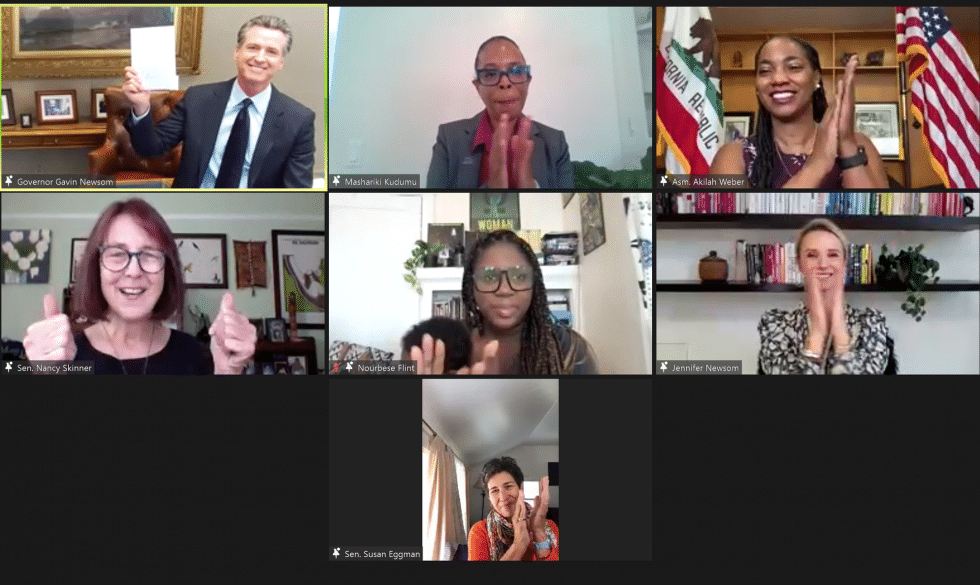
Photo of Governor Newsom signing the Momnibus Act with partners
Forget #sweaterweather or return of the PSL, it’s bill signing season – we are turning bills into laws over here!
Our Solís Policy Institute fellows and Women’s Foundation California partners championed seven bills that made it to the Governor’s desk for signing and are now laws in California. Together, we are changing who is in the room and who is at the table. And winning – everything from practical police reform, legal protections for domestic workers, and transformative and lifesaving healthcare for pregnant people.
- The Momnibus Passed!
SB 65 – The passage of the Momnibus bill keeps Black, Indigenous women, and gender expansive folks of color in California healthy while they birth and parent and provides long overdue resources to close racial, economic, and gender health gaps. The law provides birthing options like doulas, expands access to midwives, extends Medi-Cal care and provides cash aid to low-income pregnant people. We were proud to work on this piece of legislation with Sen. Nancy Skinner, Black Women for Wellness Action Project, The California Nurse Midwives Association, March of Dimes, National Health Law Program, Naral Pro-Choice California, Western Center on Law and Poverty, and over 70 health, rights, and justice organizations across California and the country. - Police Oversight
AB 481 – This law compels police departments to seek local approval before buying or receiving funds to buy military equipment like armored cars and unmanned aircraft. This law advances the need for transparency from local law enforcement to outline what kind of equipment they plan to use and for what purposes. Sponsored by Assemblymember David Chui and architected by our Pol(ICE) Reform SPI team, this law is an encouraging step toward greater police accountability. - Justice For Survivors
AB 124 – Over 90% of female-identified folks in California’s prison are themselves victims of abuse. Correcting a longstanding wrong, this law supports survivors of violence, including domestic violence and human trafficking, by providing a clear legal mechanism for trauma-informed charging, sentencing, and resentencing for survivors on trial and currently imprisoned. A huge thank you is owed to Senator Sydney Kamlager and the Young Women’s Freedom Center who worked alongside our SPI Trauma Services and Prevention team to get this law across the finish line. - Rights for Domestic Workers
SB 321 – As a part of the Stronger California Advocates Network and led by the California Domestic Workers Coalition, we’re so proud that the nannies, house cleaners, and nurses that work in more than 2 million California households will now be safer at work. The Health and Safety for All Workers Act will mandate that Cal/OSHA generate occupational health and safety guidelines specific to the domestic work industry for the first time ever. - The Silenced No More Act
SB 331 – As a part of the Stronger California Advocates Network, this legislation will make it harder for companies and corporations to hide harassment and discrimination. This expands on an existing law that prohibits companies from preventing disclosure of sexual assault, sexual harassment, and discrimination based on sex to include other forms of workplace harassment and discrimination.
- The Garment Worker Protection Act
SB 62 – Led by the Garment Workers Center with the Stronger California Advocates Network, this new law makes California the first state to require hourly wages for garment workers; it will also prohibit piecework, a pervasive system in which workers are paid per garment (often resulting in less than $3 per hour), and it will penalize both manufacturers and brands for wage theft and illegal pay practices. - The Menstrual Equity for All Act
AB 367 – Created as a part of the Stronger California Advocates Network, this bill will require free menstrual products in restrooms in public schools with grades 6-12, community colleges, California State Universities, and public buildings. By providing menstrual products in schools and public buildings, California will ensure that people who menstruate have equal access to education and public life, and are empowered to reach their full potential, irrespective of their gender or economic status.
Each of these policy wins shows just how powerful it is to have Black, Indigenous women and gender expansive folks of color championing meaningful changes for themselves and their communities. Across our network of SPI fellows and community partners, their policy work is informed by their own experiences and aimed to improve the lives of all Californians.
We are tremendously proud of our SPI fellows and community partners this year who have worked ceaselessly and called for health, safety, and prosperity for themselves, their communities, and all of us in California.